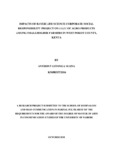| dc.description.abstract | The objective of the study is to investigate the impact of corporate social responsibility on sales of company products. Using the case of Bayer Life Science Project in West Pokot in 2017, the study sought to achieve the following specific objectives: to examine the impact of the project on the sales of the ‘belt’ insecticide in West Pokot, to establish the impact of the project on the purchase of new hybrid onion seed variety ‘Matahari F1’ among youthful farmers in West Pokot; and to investigate the impact of the project on uptake of new animal health product ‘Bayticol Pour-On’ among smallholder farmers in West Pokot. The study relied on evaluation design with a target population comprising of Bayer East Africa’s sales and marketing staff, the Life Science Project team, agrovet retail and key dealers’ staff and project beneficiaries, approximated at 500 people. The study selected a sample of 200 respondents made up of 160 project beneficiaries using stratified random sampling from three groups of farmers based on the project activities, 20 Bayer sales and marketing staff and 16 agrovet retail and key dealers’ staff in West Pokot both selected using systematic random sampling from registers provided by the project team. Additionally, four members of the project team selected using purposive sampling were also part of the sample. Quantitative data from project beneficiaries, Bayer sales and marketing staff as well as agrovet retail and key dealers’ staff was collected using survey questionnaires while qualitative data from Bayer Project team was collected using interview schedules. To analyse the quantitative data, the researcher utilized both the inferential as well as descriptive statistics and presented in tables while qualitative data was analysed using thematic analysis presented in narrative form extensively used to augment the survey data. The study found that the project had positively influenced the awareness and visibility of the three products under study to a very great extent; however, the adoption and uptake of the products was a bit gradual as the products were slightly more expensive than their competitors. The study concluded that Corporate Social Responsibility projects have direct long-term impact on sales of company products. Additionally, Corporate Social Responsibility projects have an impact on behaviour change as the Bayer Life Project changed the purchase behaviour of smallholder farmers in West Pokot. The study recommends that development partners should be supported and that such project concepts should be adopted and cascaded to other counties by other corporates and well-wishers. | en_US |



